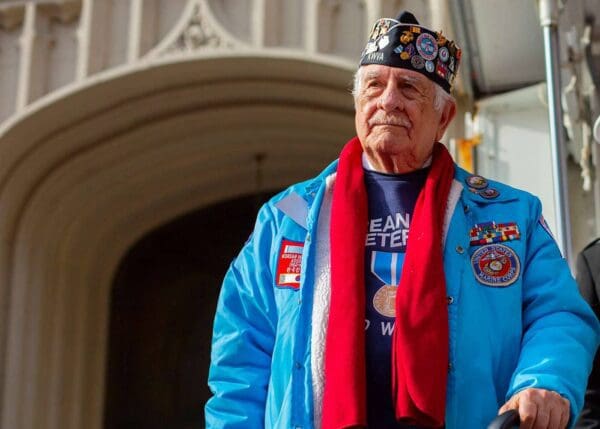01. Marine Veterans’ Benefits & Compensation
Benefits for Marine Corps Veterans With Mesothelioma
The U.S. Department of Veterans Affairs (VA) offers benefits to Marine Corps veterans diagnosed with service-related mesothelioma. The Marines relied on asbestos materials until the 1980s. Exposure to asbestos can lead to mesothelioma and other asbestos diseases. VA disability benefits can help cover healthcare and other expenses.
A mesothelioma attorney can help veterans and their families with claims.
Compensation Options for Asbestos-Exposed Marine Veterans
Eligible Marine veterans may have several compensation options, such as filing a VA claim, mesothelioma lawsuit or an asbestos trust fund claim. Each type of compensation has its own eligibility requirements.
Marine Corps veterans with an asbestos-related diagnosis may be able to file a claim with the VA. Payouts of VA claims for veterans with mesothelioma start at about $3,100 each month.
In addition to filing a VA claim, Marine veterans or their loved ones may pursue mesothelioma lawsuits. These lawsuits are legal actions against the asbestos company or companies responsible for their wrongful exposure.
Marine veterans may also be eligible to file an asbestos trust fund claim. Veterans file these claims against bankrupt asbestos companies that set aside funds to provide victims with compensation.
Marine veterans and their family members should talk to an experienced mesothelioma lawyer about their options. A dedicated mesothelioma law firm can help veterans understand their eligibility and filing options. They can also provide help throughout the entire process.
Compensation awarded through legal claims or provided by the VA can help veterans and their loved ones cover medical bills, lost income and other expenses.
Benefits for Marine Families
Spouses or dependents of deceased patients may also be eligible for VA benefits. For instance, loved ones may be able to file a VA Dependency and Indemnity Compensation (DIC) claim. A VA DIC claim can provide family members with tax-exempt money based on their individual circumstances.
Other Benefits for Marine Veterans
In addition to monthly benefit checks, Marine veterans may also be eligible for other benefits through the VA. Job training, education programs, home loan assistance, life insurance and healthcare are some of the benefits available.
The VA health system offers more than 1,200 treatment centers across the country. Because mesothelioma and lung cancer are given a 100% disability rating, veterans may receive treatment for no cost or minimal copays.
Veterans may also seek health care from local providers outside of the VA through the Veterans Community Care Program (VCCP) or other programs.
A lawyer experienced in veterans affairs can also help Marines learn about all of their benefits options and navigate the process.
Resources for Mesothelioma Patients
02. Asbestos Exposure in Marine Veterans
Asbestos Exposure in the Marine Corps
Marine Corps veterans faced frequent asbestos exposure through their duties. Marine veterans served aboard ships, on aircraft and at shipyards, which all used asbestos. The Marine Corps and other branches of the military used asbestos products through at least 1980.
Naval and Marine vessels often used asbestos. Anyone who worked on Navy ships or in naval shipyards may have experienced asbestos exposure. Because of the Marine Corps’ close ties with the Navy, many Marine veterans faced exposure while serving aboard Navy vessels.
Marine Corps veterans and service members also faced other exposure risks. Aircraft, vehicles, equipment and barracks all frequently contained asbestos products. Many veterans were exposed to asbestos and continue to develop asbestos-related diseases. Veterans across all branches established before the 1980s account for 30% of mesothelioma diagnoses in the United States. Veterans make up only 8% of the population.
Asbestos Exposure on Ships and Shipyards
Marine veterans frequently served aboard naval ships and in shipyards. From the 1930s until the 1980s, Navy ships contained many asbestos components.
Asbestos was used throughout naval ships for fireproofing and durability, including in:
- Boiler rooms
- Gaskets
- Hot water pipe coverings
- Insulation
- Steam pipe coverings
- Valves
While aboard ships, Marines completed maintenance tasks in the same capacity as any Navy service members. During the completion of these tasks, asbestos products may have been disturbed. This could release microscopic asbestos fibers into the air and cause exposure.
Asbestos Exposure on Aircraft and Air Stations
Marine Corps service members may have also served in aviation units. Like naval vessels, military aircraft often were constructed with various asbestos components. Air stations also frequently contained asbestos products.
On aircraft, asbestos could be found in various materials and equipment, including:
- Brake pads
- Engines
- Heat shields
- Insulation
Marine veterans who served on or maintained aircraft faced the risk of asbestos exposure.
Air stations and bases also frequently had asbestos risks. Reports indicate Marine Corps Station Miramar in San Diego contained asbestos in the barracks. Marine Corps Air Station Yuma in Arizona also contained asbestos. Yuma Air Station was previously used by the Air Force but became a Marine Corps base in 1962.
Yuma Air Station had many hazards and became an asbestos Superfund site in 1990. A Superfund site is a contaminated location that requires cleanup. The Environmental Protection Agency (EPA) oversees the cleanup of Superfund sites. Asbestos removal was completed in 1999 and other cleanup efforts of the site continue.
Other Asbestos Exposure Risks for Marines
Marine Corps service members and veterans faced other asbestos exposure risks. Asbestos could be found in barracks and sleeping quarters, other buildings on base, vehicles and equipment.
One potential source of exposure was the M60 Patton tank. This vehicle was introduced in 1959 and contained various asbestos components, such as the brake pads. Tank crews also often had to wear asbestos mittens or asbestos blankets to protect themselves from heat.
Reports also indicate asbestos on various Marine Corps bases.
Active-Duty Marines May Still Be at Risk of Asbestos Exposure
A 2020 evaluation from the Department of Defense Office of Inspector General reported military housing in the United States and other countries may still contain asbestos materials. As a result, service members on active duty face a continued exposure risk.
03. Marine Veterans’ Mesothelioma Risk
Mesothelioma Risk Among Marine Corps Veterans
Marines who served before the 1980s may be at risk of developing mesothelioma and other asbestos-related diseases, like asbestosis. Due to the long latency period of asbestos diseases, Marine veterans continue to be diagnosed.
Marine veterans who may have been exposed to asbestos should talk to their doctor. They can help monitor for potential signs and symptoms of asbestos disease.
04. Preventing Asbestos Exposure
Protecting Marines From Asbestos Exposure
Marine veterans and current service members face the risk of developing asbestos-related diseases. Although the Marine Corps stopped using asbestos by the 1980s, old asbestos materials may remain and endanger service members.
The Marine Corps and other U.S. military branches have enacted programs and regulations to help protect Marines from the dangers of asbestos.
- The Asbestos Medical Surveillance Program (AMSP) run by the Navy maintains records of veterans who faced asbestos exposure. Through the program, veterans can seek health monitoring for asbestos-related diseases.
- The Marine Corps Asbestos Safety Program was created to eliminate asbestos exposure among service members. The program focuses on substituting asbestos with other materials. The program also provides training and personal protective equipment for any personnel working with asbestos.
- The Marine Corps Environmental Compliance and Protection Program helps enforce compliance through asbestos regulations from the EPA and the Occupational Safety & Health Administration (OSHA).
These measures and better awareness of the risk of asbestos materials can help prevent future asbestos exposure among Marines.
05. Common Questions
Common Questions About Marines and Mesothelioma
-
Why do Marines get mesothelioma?
- Many Marine Corps veterans get mesothelioma because of exposure to asbestos during service. Veterans in general have a high risk of developing mesothelioma. The military used asbestos products up to the 1980s. Marines faced asbestos exposure onboard Navy ships, in planes and at bases.
-
How do you prove asbestos exposure in the military?
- If needed, Marine Corps veterans can prove asbestos exposure with three documents:
- A doctor’s letter that explains the link between an illness and asbestos exposure
- Medical records
- Service records showing job or specialty
Mesothelioma lawyers can help veterans file various types of claims.
-
Can you sue the military for asbestos exposure?
- Most veterans do not sue the military but instead receive compensation through the VA. The VA offers benefits in honor of veterans’ service to their country without having to sue them. Veterans may seek additional compensation from asbestos companies through lawsuits and trust fund claims.
-
What if a Marine veteran dies from an asbestos-related illness?
- Family members of Marines who died from mesothelioma or another asbestos disease have options. The U.S. Department of Veterans Affairs offers family benefits. Families may also be able to file wrongful death lawsuits against asbestos manufacturers or suppliers. A mesothelioma lawyer can explain the options.








